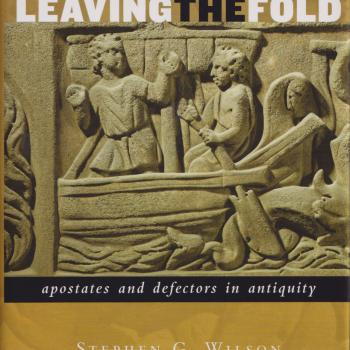
Statistics show that half of all first marriages in the Unites States end in divorce. Second and third marriages have a much higher rate of failure. Fewer and fewer people are getting married but, instead, just live together. And those who do marry are getting divorced at a higher rate than ever. There was a time when a statistically high percentage of people embraced Paul’s position that “neither is the man without the woman, neither the woman without the man, in the Lord.” (NIV 1 Corinthians 11:11) However, because the stigma once associated with divorce has largely faded, people are more comfortable than ever with severing a relationship that was once considered “until death do you part.” So, what does the Bible have to say about divorce? Here are a few of the most significant verses on the subject.
In the Book of Malachi, we read: “‘The man who hates and divorces his wife,’ says the Lord, the God of Israel, ‘does violence to the one he should protect,’ says the Lord Almighty.” (NIV Malachi 2:16) The essential meaning of this rendering of the passage is that a husband has a duty to his wife and should not harm her by divorcing her. This was particularly true in antiquity, when a woman who had divorced did not have the ability to go out and provide for herself; and she would often struggle to be accepted in a second marriage. While the New International Version renders the Hebrew, “The man who hates…his wife,” a more common rendering of the Hebrew is this: “The Lord God All-Powerful of Israel hates anyone who is cruel enough to divorce his wife. So, take care never to be unfaithful!” (CEV Malachi 2:16) In other words, most translators believe that the Hebrew is saying that God “hates” cruel men who “divorce their wives”—placing them in an impossible situation (post-divorce). While God’s nature is not “hateful,” it seems fair to say that He is greatly displeased with us when we act in “hateful” ways toward our spouse—someone we promised we would love, honor, support, and sustain for the rest of our lives. Thus, Malachi certainly sees God as unhappy with those who choose to divorce, at least, those who do so without cause.
Jesus makes an interesting point about divorce. He taught: “Because of your hardness of heart Moses permitted you to divorce your wives; but from the beginning it has not been this way.” (NASB Matthew 19:8) In other words, while Christ acknowledge that divorce was allowed in His day, that was the result of the “hardness of the hearts” of people, and not because God willed it. Moses made an exception, allowing for divorces, having seen that many struggled to be all that they should be in a marriage, or in relationships generally. However, Jesus made it clear that this was not what God wanted and, from the days of Adam and Eve, God had intended marriage to be a permanent relationship. Thus, speaking of married couples, Jesus said, “no one should split apart what God has joined together.” (CJB Matthew 19:6) Some have argued that his passage speaks of Church marriages as opposed to civil marriages. Perhaps that’s true. However, it seems quite clear that in the earliest days of the history of the world, there were no civil marriages. All marriages initially were sacramental. Thus, God’s will from the beginning was that “no one should split apart” any marriage—civil or sacramental.
The Apostle Paul had quite a bit to say about marriage. In 1 Corinthians chapter 7 he offered several insights into God’s views on divorce. Paul wrote: “To the married I give this charge (not I, but the Lord): the wife should not separate from her husband. (but if she does, she should remain unmarried or else be reconciled to her husband), and the husband should not divorce his wife.” (ESV 1 Corinthians 7:10-11) In this passage, Paul tells us that his counsel is not his own; rather it is the commandment of the Lord. He says neither a man nor woman should divorce their spouse. And, if they do, Paul says that they should not remarry, except if they remarry each other. Jesus actually taught something that clarifies Paul’s teaching on divorce. Jesus said: “But I tell you that anyone who divorces his wife, except for sexual immorality, makes her the victim of adultery, and anyone who marries a divorced woman commits adultery.” (NIV Matthew 5:32) Later, Jesus made essentially the same point: “Whoever divorces his wife, except for sexual immorality, and marries another, commits adultery.” (ESV Matthew 19:9) Jesus’ point was that there are times when divorce is justified. One of those times is when the spouse has been sexually unfaithful to his or her partner. In such a case, Jesus tells us that a man or woman would be justified in divorcing the unfaithful partner. Note, Jesus doesn’t say that the faithful spouse is ‘commanded’ to divorce the unfaithful partner; only that he or she has the ‘right’ to. One would assume in the case of some form of serious abuse, Jesus would also justify divorce—though the Bible is not surprisingly silent on this point, as the culture in biblical times was quite different than the culture of today.
Paul also gave some counsel to the believer who had married a non-believer; something quite common in the early days of Christianity, where everyone was a convert, and many converted after they had already married. Paul wrote, “If your husband isn't a follower, but is willing to stay with you, don't divorce him. Your husband or wife who isn't a follower is made holy by having you as a partner.” (CEV 1 Corinthians 7:13-14) However, Paul does say, “But if the unbeliever leaves, let it be so. The brother or the sister is not bound in such circumstances; God has called us to live in peace.” (NIV 1 Corinthians 7:15) Essentially, Paul felt that conversion to Christ should not, of itself, give us reason to divorce our non-believing partner. Paul felt like staying with the non-believer, living the kind, loving and holy life that Christianity teaches that we should, may very well convert the non-believing spouse. If, however, that non-believing spouse divorces the believer, Paul says “So be it.” In such a case, the believer is not “bound” or obligated to stay in the marriage.
Essentially, the Bible says divorce was never what God wanted for families and couples. Yes, exceptions have been allowed by God on the grounds of sexual immorality or if the non-believing spouse leaves. Nonetheless, the biblical text could not be clearer that God is not happy with the current trend of divorcing simply because marriage is often hard. According to the Bible, God sees divorce as a dereliction of duty which He has indicated is contrary to His will. He invites us to battle to make our marriage work, even in the face of challenges, and to seek to stay “in” rather than to look for reasons to justify an “exit” from what was once considered a permanent relationship.
Bible Verses about Divorce
(NIV 1 Corinthians 11:11) "Neither is the man without the woman, neither the woman without the man, in the Lord."
(NIV Malachi 2:16) "'The man who hates and divorces his wife,' says the Lord, the God of Israel, 'does violence to the one he should protect,' says the Lord Almighty."
(CEV Malachi 2:16) "The Lord God All-Powerful of Israel hates anyone who is cruel enough to divorce his wife. So, take care never to be unfaithful!"
(NASB Matthew 19:8) "Because of your hardness of heart Moses permitted you to divorce your wives; but from the beginning it has not been this way."
(CJB Matthew 19:6) "No one should split apart what God has joined together."
(ESV 1 Corinthians 7:10-11) "To the married I give this charge (not I, but the Lord): the wife should not separate from her husband. (but if she does, she should remain unmarried or else be reconciled to her husband), and the husband should not divorce his wife."
(NIV Matthew 5:32) "But I tell you that anyone who divorces his wife, except for sexual immorality, makes her the victim of adultery, and anyone who marries a divorced woman commits adultery."
(ESV Matthew 19:9) "Whoever divorces his wife, except for sexual immorality, and marries another, commits adultery."
(CEV 1 Corinthians 7:13-14) "If your husband isn't a follower, but is willing to stay with you, don't divorce him. Your husband or wife who isn't a follower is made holy by having you as a partner."
(NIV 1 Corinthians 7:15) "But if the unbeliever leaves, let it be so. The brother or the sister is not bound in such circumstances; God has called us to live in peace."
2/26/2024 10:53:18 PM

















